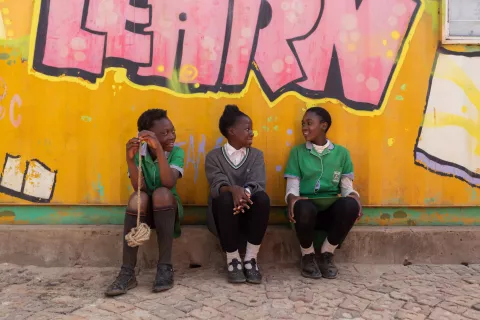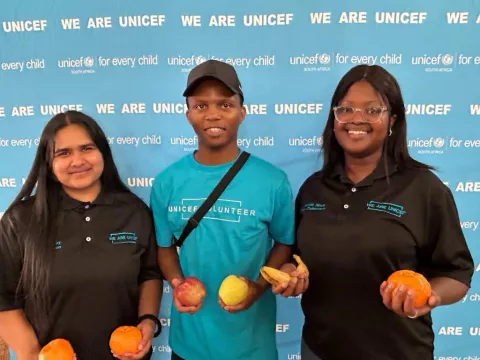New data indicates 30% decline in confidence in childhood vaccines in South Africa
UNICEF’s flagship report highlights 1 in 5 children in South Africa are under-immunised amid heightened vaccine scepticism during COVID-19, while 67 million children globally missed out on one or more vaccinations over the past 3 years.

JOHANNESBURG 20 April 2023 – The State of the World’s Children 2023: For Every Child, Vaccination reveals that the decline in confidence comes amid the largest sustained backslide in childhood immunisation in 30 years, fuelled by the COVID-19 pandemic. The pandemic interrupted childhood vaccination almost everywhere, South Africa included, due to intense demands on health systems, the diversion of immunization resources to COVID-19 vaccination, health worker shortages and stay-at-home measures.
The perception of the importance of vaccines for children declined by 29.9 percent in South Africa and by more than a third in the Republic of Korea, Papua New Guinea, Ghana, Senegal and Japan after the start of the pandemic. In the new data – collected by The Vaccine Confidence Project* and published today by UNICEF – China, India and Mexico were the only countries studied where the data indicates the perception of the importance of vaccines held firm or even improved.
Despite the falls, overall support for vaccines remains relatively strong. In almost half the 55 countries studied more than 80 percent of respondents perceived vaccines as important for children. However, the report warns the confluence of several factors suggest the threat of vaccine hesitancy may be growing. These factors include uncertainty about the response to the pandemic, growing access to misleading information, declining trust in expertise, and political polarisation. Today’s report warns a total of 67 million children missed out on vaccinations between 2019 and 2021, with vaccination coverage levels decreasing in 112 countries.
“At the height of the pandemic, scientists rapidly developed vaccines that saved countless lives. But despite this historic achievement, fear and disinformation about all types of vaccines circulated as widely as the virus itself,” said Catherine Russell, UNICEF Executive Director. “This data is a worrying warning signal. We cannot allow confidence in routine immunizations to become another victim of the pandemic. Otherwise, the next wave of deaths could be of more children with measles, diphtheria or other preventable diseases.”
Most zero-dose children, 86,4 percent, live in 20 districts – the poorest performing in reaching immunization coverage targets.
Children born just before or during the pandemic are now moving past the age when they would normally be vaccinated, underscoring the need for urgent action to catch up on those who were missed and prevent deadly disease outbreaks. In 2022, for example, the number of measles cases was more than double the total in the previous year with South Africa also recording a measles outbreak towards the end of 2022 as efforts continue to contain it.
Speaking ahead of the South Africa launch of The State of the World’s Children report in Sandton on Friday, 21 April, UNICEF South Africa Representative Christine Muhigana outlined the urgent action needed to reach every child. “While we address concerns about the safety and efficacy of vaccines and engage all stakeholders, caregivers and faith-based organisations to build trust in and demand for life-saving immunisations, we must also commit to removing the barriers to access, investing in and exploring innovative financing solutions and building resilient systems that can respond to future outbreaks, epidemics or pandemics”.
The COVID-19 pandemic also exacerbated existing inequities. For far too many children, especially in the most marginalised communities, vaccination is still not available, accessible or affordable. “We are constantly reminded that vaccines alone don’t save lives, vaccination saves lives”, said Muhigana. “Zero-dose and under-immunised children face multiple deprivations, and it will take a considerable and holistic response to not only build back immunity but to also ensure that these children are nourished, safe and are supported to play, learn and thrive”.
The report is urging governments around the world to:
- Urgently identify and reach all children, especially those who missed vaccinations during the COVID-19 pandemic
- Strengthen demand for vaccines, including by building confidence
- Prioritise funding to immunization services and primary health care
- Build resilient health systems through investment in female health workers, innovation and local manufacturing
The event also comes ahead of Africa Vaccination Week from the 24th - 30th April. UNICEF South Africa’s multi-media community engagement vehicle – #TheTruck – will be supporting the National Department of Health at a series of engagements throughout the week to highlight the importance of childhood and routine immunisation.
“Immunizations have saved millions of lives and protected communities from deadly disease outbreaks,” said Catherine Russell. “We know all too well that diseases do not respect borders. Routine immunizations and strong health systems are our best shot at preventing future pandemics, unnecessary deaths and suffering.”
####
Media contacts
Additional resources
About UNICEF
UNICEF works in some of the world’s toughest places, to reach the world’s most disadvantaged children. Across more than 190 countries and territories, we work for every child, everywhere, to build a better world for everyone.
Follow UNICEF South Africa on Twitter, Facebook, Instagram, YouTube and LinkedIn





